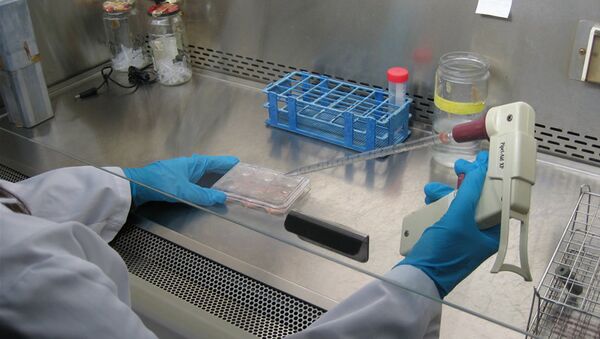WASHINGTON, January 22 (RIA Novosti) - A renowned Harvard University professor was forced Tuesday to deny he was planning to clone a Neanderthal hominid after news stories to this effect went viral on the internet based on an erroneous reading of remarks he made to a German magazine.
“I’m certainly not advocating it,” Harvard geneticist George Church told the Boston Herald after many of the most respected US media brands including NBC News, CBS News, Fox News, Yahoo and the Huffington Post ran with stories based on an interview with German weekly Der Spiegel.
In an email to RIA Novosti, Church made clear his comments evoking the theoretical possibility of cloning a Neanderthal had been misinterpreted by other media as a practical intention. He referred readers to the Boston Herald for his efforts to clear up the misunderstanding.
“The real story here is how these stories have percolated and changed in different ways,” said Church, one of the initiators of the Human Genome Project, a landmark scientific undertaking aimed at identifying and mapping the genes in human DNA.
The erroneous stories triggered a firestorm of ethical debate in the blogosphere on whether recreating a long-extinct hominid believed to be a precursor to the modern human would be morally acceptable or would serve any interest of humanity today.
“I am concerned about the thought of going down this road and redesigning human beings,” said Marcy Darnovsky, acting executive director for the Center for Genetics and Society, a California-based non-profit group that advocates responsible use of new genetic and reproductive technologies.
“We really risk creating a whole new line of inequality,” Darnovsky told RIA Novosti by phone. “I find it very troubling.”
No one is more keenly aware of the ethnical aspect of the “Neanderthal clone” story than Church himself.
In his effort to set the record straight with the Boston Herald, the professor made clear that while he was not advocating the cloning today of an extinct pre-human species the technological ability to do just that was close at hand, requiring thorough and thoughtful discussion in society about such a prospect.
“I’m saying, if it is technically possible someday, we need to start talking about it today,” Church said.
According to the Herald, Church’s phone was “ringing off the hook” with calls from reporters around the world wanting more detail about an erroneous story.
It was not clear exactly at what point the original Der Spiegel interview jumped off the rails and mutated into a story asserting that Church was intent on producing a creature today containing genetic coding from an antecedent that is believed to have become extinct around 30,000 years ago.
However, in its report on the Der Spiegel interview, Britain’s Daily mail blared: “Wanted: ‘Adventurous Woman to Give Birth to Neanderthal Man’,” and went on: “Church’s plan would begin by artificially creating Neanderthal DNA based on genetic code found in fossil remains. He would put this DNA into stem cells. These would be injected into cells from a human embryo in the early stages of life.”
Church said he hoped the real story would be cleared up sooner or later and said the current confusion was an interesting teaching tool.
“I’m not going to run away,” he said. “I want to use it as an educational moment to talk about journalism and technology.”


